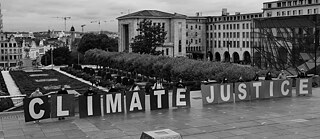How do we make the transition towards a sustainable world Just and why is it important?
The importance of climate JUSTICE

When talking about the climate crisis it is crucial to keep in mind that even though we are all in the same storm, we are not all in the same boat. Some of us have yachts, some have canoes and others are drowning. During the transition towards a climate neutral economy, we must recognise that not everyone is starting from the same point. We might all share the same ambitions, but some may need more support than others to get there. A Just transition means taking into account the frontline communities currently impacted by the climate crisis, as well as ensuring that no one is left behind in the transition towards a more sustainable economy.
By Lola Segers
How is the EU making the transition Just?
In 2020 the European Commission presented the EU Green Deal's Just Transition Mechanism (JTM) to ensure a Just transition towards a greener world where no one is left behind. This was an important addition to the Green Deal and its aim to reach net zero emissions by 2050. The Mechanism is based on three pillars;
FIRST - The Just Transition Fund - 7,8 billion €
It is an EU funding tool for regions highly dependent on fossil fuel- and high emission industries. The funding will be invested in green firms, research and innovation, reskilling of workers, job search assistance, etc.SECOND - The Just Transition scheme under InvestEU - 1,8 billion €
This second pillar will provide funding for a wider range of investments such as energy and transportation infrastructure.
THIRD - The Public Loan Facility - 1,5 billion € and a 10 billion € loan from the European Investment Bank
The Public Loan Facility will essentially support public investments by offering preferential loaning conditions to those areas most affected by the transition.
The funding of the EU JTM will mainly be used to support regions in Europe that are still highly dependent on fossil fuels (e.g. Poland, Greece, etc.). These regions will of course have to undergo the biggest transition and will need support in order to make the transition Just and protect those who will be impacted the most; those working in high emission industries that no longer have a place in tomorrow's world.
What do we want? CLIMATE JUSTICE! When do we want it? NOW!
The term climate justice is crucial. When using this term, climate change is being framed more broadly. It is used to include the ethical, social and political aspect rather than purely the physical environmental part of climate change.
Over the last few years the global climate movement has been attempting to shift the attention away from the Western-world to MAPA* regions to recognize the difficulties these regions are already experiencing because of the consequences of climate change. We believe that the Western-world has the responsibility to give extra support to MAPA regions, because these regions are suffering the most, while they contributed the least to the climate crisis. (I talk about the importance of this more broadly in my previous blog).
Despite the efforts, on a political level we see that this is not taken into account. The JTM is only focussing on EU citizens, without taking the Just transition beyond the EU borders. The fossil fuel phase out won't only affect those in Europe who are still dependent on harmful sectors, but also those in other nations that rely on trade from and to Europe. When Europe continues trade in these harmful resources, the transition is only an illusion, but when ending trade completely we must also bring the Just transition concept further than just Europe. Globalisation has led to us having a deep connection with nations all over the world. Besides the benefits this has brought us, it also requires caring for each other beyond our geographical boundaries.
Climate justice can not be separated from social justice. We must get everyone on board and leave no one behind when making the transition. The fight against climate change is about creating a greater world for everyone and this won't be achieved without recognizing the inequality we are facing in our current world since it would bring us from one problem (the climate crisis) to another (more social crises). We must care for our people, all of our people.
The lines of national borders on maps are artificial constructs, as unnatural to us as they are to birds flying overhead. Our first impulse should be to ignore them.
Mohsin Hamid
Let us be inclusive, let us involve everyone, let us create a dialogue between both nations and different generations. How? Read more in next week's blog!
*MAPA stands for Most Affected People and Areas. It is used to make the communities that suffer the most from the effects of climate change more visible.